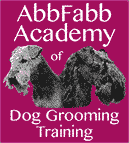The 2006 Small Animal Welfare Act is a legal requirement that came into force in the U.K. in 2006.
It gives legal protection to all small animals which is simplified into 5 needs. Here at Abbfabb Academy of Dog Grooming Training, we follow this law as closely as possible, and it forms a central part of all our dog grooming courses.
Who has to comply with this law?
All persons working with small animals have a legal responsibility to comply with the Small Animal Welfare Act. These include dog grooming schools, dog groomers ( whether qualified or not ), boarding kennels, pet shops that sell live animals, dog walkers, home boarders, zoos, petting farms and all owners and keepers of small animals. The legislation states :
“Owners and keepers have a duty of care to their animals and must make sure they meet their needs”.
What are the 5 Needs?
The 5 Needs accorded to small animals are as follows:
- For a suitable environment and place to live.
- For a suitable diet.
- To exhibit normal behaviour patterns.
- To be protected from pain, injury, suffering and disease.
- To be housed with, or apart from, other animals, if applicable.
How do we make sure these 5 Needs are met?
Different activities involving small animals will have different ways of complying with this legislation. For example, we do not feed dogs in our dog grooming school. But naturally, a boarding kennel or cattery does feed dogs and cats in their care, but it needs to be suitable food for those individual animals.
At Abbfabb Academy of Dog Grooming Training, we interpret the law in such a way that we can train students and at the same time, comply with its requirements.
- The Need For A Suitable Environment and Place To Live: Our dog grooming school is secure and hygienic and all our equipment is safe and fit for purpose. There is constant airflow, adequate heat and light, and our rest crates are clean, of the correct size and in excellent repair. We regularly deep-clean our dog grooming salon which minimises the possibility of cross-infection and gives the dogs and our students a pleasant environment to be in.
- The Need For A Suitable Diet: We do not offer food or treats to the dogs in our care, except that a client gives us. Dogs with diabetes, for example, may need to be offered food but this is done only when the client gives us written instructions. Feeding dogs in a dog grooming salon is very risky because of the possibility of choking or an unforeseen allergic reaction. However, water is an essential part of a dog’s diet so we offer cool, clean, fresh water approximately every half an hour.
- The Need To Exhibit Natural Behaviour Patterns: All dogs need to be able to relieve themselves so they are taken out for regular comfort breaks. We do not accept bitches that are in season and at the point where they could conceive a litter at the same time as an uncastrated male. To allow them to exhibit normal behaviour in this scenario would be reckless and dangerous so we avoid the situation by taking care with our bookings. Dogs, depending on their health status or age, may need to be allowed to rest more so we provide the opportunity for this. Aggression, for a small minority of dogs, is a way of expressing fear and/or anxiety. Whilst this is normal behaviour for these particular dogs, it is not something that we feel we can safely deal with. Owners of aggressive dogs are advised to have their dogs groomed by a veterinarian under sedation.
- The Need To Be Housed With, Or Apart From, Other Animals As Applicable: All dogs in our grooming school are kept separate from each other during the whole grooming process. This minimises the chances of fights, accidental matings, spread of disease and parasitic infestations. If two, or even 3 dogs are from the same family, and it’s safe to do so, we will keep them together.
- The Need To Be Protected From Pain, Suffering, Injury and Disease: A dog grooming appointment should be a pleasant and stress-free experience for the dogs in our care. We do not put any dogs through a painful experience by de-matting knotted coats. All large areas of knots are painlessly clipped out and we will talk through a regular grooming plan with the client to try to prevent the problem from occurring in the future…
- We do not force dogs to stand up for long periods, especially if they are very young, very old, are in pain or have a disability such as a missing limb, or a disease such as arthritis.
- No dogs are ever harshly handled…..if we cannot carry out a grooming appointment by using kindness and patience, then we will discuss with the client the best way forward.
- We recognise zoonotic diseases such as sarcoptic mange, which is extremely contagious and can be transmitted to humans as scabies. We also deal very quickly with any occurrence of flea infestations, ringworm and visible tapeworm larvae.
- If we find that a dog is unwell and cannot be groomed we will contact the client and rearrange the appointment after veterinary treatment has been provided.
Education is key for encouraging a better life for all small animals.
Many people have no idea that this law exists. Here at Abbfabb Academy of Dog Grooming Training, we incorporate its requirements into all our dog groomer training courses. And we actively encourage our clients to think about how to make sure they comply with the requirements of the Small Animal Welfare Act. This can only lead to a more fulfilled and happy life for all small animals.
